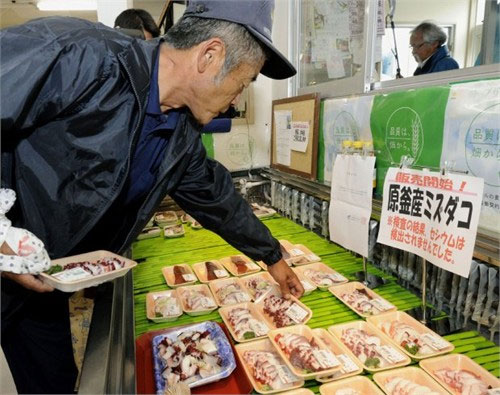Fukushima seafood 're-export' market after nuclear disaster
For the first time after more than a year of a nuclear leak at Fukushima Daichi (Japan), a number of seafood caught at the coast near the factory has been on the market today. (June 25).
However, due to the concern that radioactive content remains in the body of seafood, the consumption of items such as octopus and sea snail is still quite limited.
According to the Fisheries Cooperative of Fukushima Prefecture, octopus and snail - a type of sea snail, has been selected as the first containerized product because radioactive cesium inspection does not appear in all This product.
Fishermen have caught octopus and tails on Friday, then boiled so these products can be preserved for a long time.

Some seafood caught in the Fukushima coast area has been circulated in the market
Meanwhile, flounder, grouper and many other fish caught in the Fukushima coast area are still unable to "re-export" in the market because they are still exposed to radioactive substances in the marine environment.
It is worth mentioning that the Japanese government has approved for the circulation of the above seafood while the radioactive content in these products exceeds the permitted limit.
The reason is that the Japanese government has conducted a series of iodine radioactive tests, but the decay cycle of iodine is shorter than cesium so these products are quite safe to use.
Mr. Yasuhiro Yoshida - manager of York Benimaru supermarket in Soma city said that the taste of the seafood displayed here is very delicious. The supermarket also sold 30kg of sea snail and 40kg octopus in the first day of putting these items on shelves.
The tsunami disaster struck on March 11, 2011, completely devastating the northeast coast of Japan and evacuating tens of thousands of people.
All towns near the Fukushima Dai-ichi nuclear power plant area are exposed to radiation because the nuclear reactors in the plant have melted before the attack of the earthquake and tsunami.
Mr. Hirofumi Konno - an official in charge of the Soma City Fisheries Cooperative business hopes that crabs will be the next item to be marketed by regular radiation exposure tests. Do not detect any kind of dangerous radiation in this type of seafood.
However, for other types of fish, the waiting time on the market may last for many years because the radioactive content has decreased but radioactive cesium has remained for many years.
According to Mr. Konno, the purchase of Fukushima seafood is intended to support local fishermen because these products are still not circulated throughout Fukushima prefecture or in Tokyo city.
Not only seafood but also agricultural land in Fukushima have been exposed to radioactive substances. Therefore, immediately after harvesting, rice products in some areas have been taken for inspection before being sold on the market.
Many people believe that the picture of consuming products from Fukushima is extremely bleak. Because customers are always worried about health problems when consuming these items, especially with the development of children.
- Fukushima 7 years after nuclear disaster
- Looking back on 2 years of Fukushima nuclear disaster
- Fukushima is 'artificial disaster'
- Japan restarted nuclear power after the Fukushima disaster
- The impact of Fukushima nuclear disaster is greater than most people think
- Nuclear disaster can happen at any time
- First move nuclear fuel in Fukushima
- Plants mutated genes because of radiation near Fukushima
- The Fukushima disaster caused serious ocean contamination
- A wake-up call from 'artificial disaster' Fukushima
- Radioactive material from the Fukushima disaster is found in California
- Fukushima radiation spreads to the US coast
 Green tea cleans teeth better than mouthwash?
Green tea cleans teeth better than mouthwash? Death kiss: This is why you should not let anyone kiss your baby's lips
Death kiss: This is why you should not let anyone kiss your baby's lips What is salmonellosis?
What is salmonellosis? Caution should be exercised when using aloe vera through eating and drinking
Caution should be exercised when using aloe vera through eating and drinking